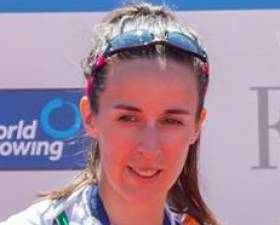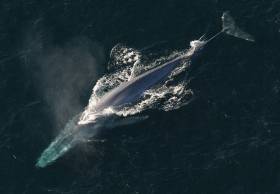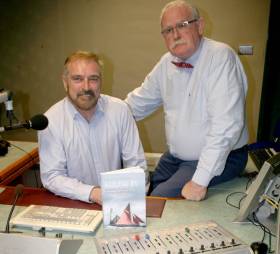Displaying items by tag: RTE
An Aran island family with several generations of volunteering with the RNLI lifeboat are featured in the first episode of a special series of RTÉ Radio 1’s Seascapes to mark the RNLI’s bicentenary.
The three-part series also carries an interview tonight with maritime historian Cormac Lowth, and with artist David Rooney who designed two new stamps to celebrate the RNLI.
Daniel O’Connell, who first signed up as a volunteer with the Aran offshore station ten years ago, explains that he took the decision after his eldest son, Jack, was rushed to hospital with several tonsillitis.
Jack and his siblings Olive and Eoghan are also interviewed about their experience, along with their mother Lena, who is press officer, their grandmother Margaret, who has been station treasurer, and newly appointed Aran coxswain Aonghus Ó hÍarnáin.
Cormac Lowth, dubbed a “one man maritime museum” by Afloat.ie’s WM Nixon, summarises the history of the lifeboat service in Ireland, while artist and musician David Rooney talks about what inspired him to design the new stamps for the RNLI which were issued earlier this month by An Post.
Seascapes, to mark the RNLI’s 200th anniversary, is presented by Lorna Siggins and produced by Brian Lally. Part one of the three-part special series will be broadcast on Friday night, March 15th, at 10.30 pm on RTÉ Radio 1 and the RTE Radio App, and will be available on the RTÉ Player.
Irish Marine Wildlife Documentary Wins Top Film Festival Prize
Maritime TV documentary North Atlantic: The Dark Ocean has been awarded the Grand Prix Best Film of Festival Award at the Wildlife Film Festival Rotterdam, besting the likes of BBC’s Our Frozen Planet.
As previously reported on Afloat.ie, the natural history series supported by the Marine Institute follows Irish underwater cameraman Ken O’Sullivan as he searches the North Atlantic waters around Ireland for some of the largest marine wildlife ever to have lived, including fin and sei whales, killer whales and courtship aggregations of massive basking sharks.
The series was broadcast in May of this year to what RTE describes as “an incredibly positive public response”.
In presenting the award to Ken O’Sullivan, the judging panel said: “Myths about sea monsters have long shaped our exploitation and maltreatment of marine life. The film that wins the Flamingo Grand Prix 2023 debunks those myths with solid knowledge and, by showing the grandeur and beauty of ocean life, it makes you realise this should be loved and protected.
“The film is an epic voyage of discovery. Free diving along with the filmmaker himself, you actually come face-to-face with a multitude of sea creatures, ranging from sprat, herring, basking sharks to killer whales, common dolphins and fin whales. All lovingly portrayed in with great craftsmanship and years of experience.
“This engaging filmmaker grabs you and takes you down into the dark waters surrounding Ireland. We — the jury — all held our breath until the end.”
New TV Series ’North Atlantic - The Dark Ocean’ Reveals Never-Before Filmed Behaviours of Iconic Marine Wildlife
North Atlantic – The Dark Ocean is a new TV series from Irish underwater cameraman Ken O’Sullivan that begins this Sunday 14 May at 6.30pm on RTÉ One and RTÉ Player.
Supported by the Marine Institute, this new natural history series follows O’Sullivan as he voyages off Ireland’s coast and out into the open North Atlantic in search of large whales, deep-water sharks and other iconic marine wildlife that inhabit our dark ocean — and reveals never-before-seen behaviours and challenges of some of our greatest wild animals.
Inspired by the spirit of adventure of early explorers such as St Brendan the Navigator, O’Sullivan journeys out into the open North Atlantic in search of the great sea monsters described in their early texts.
After more than 10 years, he finally swims with a fin whale and captures incredible footage that documents its individual patterns.
Using an unmanned submarine aboard the RV Celtic Explorer, O’Sullivan journeys to the deepest parts of Ireland’s Atlantic waters where he discovers thousands of cat sharks in a deep-water nursery. He also addresses the decimation of sharks in Ireland and across the globe.
North Atlantic - The Dark Ocean also deals with the concerning issue of the treatment of our oceans and its creatures. The series explores concerns such as toxicity in whales from human activity in the ocean and the decimation of fin whales due to whaling. The series emphasises how society must work harder to conserve these precious ecosystems.
In episode one, broadcast this Sunday 14 May, O’Sullivan explores the dark ocean waters to the north of Ireland. Here he encounters monstrous winter storms and discovers that these are a huge source of fertility in the ocean. He meets a group of minke whales lunge-feeding on shoals of sprat, and travels to Arctic Norway in search of massive herring shoals that once abounded in Ireland.
In episode two (Sunday 21 May), O’Sullivan travels the south coast of Ireland searching for fin whales. These hugely enigmatic creatures are the second largest animals to have ever lived, but almost nothing has been documented about their migration routes, especially for breeding, until now.
O’Sullivan voyages 1,500km out to the Mid-Atlantic ridge in search of more fin whales. Here he finds sea mounts, oases of life in the open ocean, and gains a deeper understanding of the ocean’s eco-system.
In the series finale (Sunday 28 May), O’Sullivan embraces the spirit of early explorers and gains an understanding of some of the ocean’s greatest and most diverse animals, from the surface waters to the deepest parts of the North Atlantic. He documents more than 30 basking sharks engaged in a courtship ritual – possibly the largest ever group of their kind captured on camera.
The series also features an original classical music soundtrack by young composer Bradley Ayres, performed by the RTÉ Concert Orchestra.
Speaking about the series, Ken O’Sullivan said: “Almost three years in production, North Atlantic – The Dark Ocean is a hugely ambitious natural history TV series featuring the iconic creatures and fascinating marine life of Ireland’s North Atlantic ocean.
“It would not have been possible without the support of many. We are particularly grateful to the Marine Institute for providing us with ship time and access to the RV Celtic Explorer and their remotely operated vehicle, the ROV Holland I, which enabled us to voyage further, explore deeper and share amazing discoveries in Ireland’s deep ocean.”
North Atlantic - The Dark Ocean starts this Sunday 14 May at 6.30pm on RTÉ One and RTÉ Player.
New TV Series ‘Ireland’s Wild Islands’ Captures Marine Wildlife Wonders of Our Atlantic Isles
Three years in the making, Ireland’s Wild Islands is a spectacular three-part TV series that features the marine wildlife wonders of Ireland’s Atlantic islands.
Shot in cinema-quality 4K, the series is hosted by Corkman Eoin Warner who sails a 140-year-old Galway hooker out into the Atlantic to showcase the extraordinary wild magic of Ireland’s western islands.
In the first episode, broadcast this past Sunday (23 April), Eoin starts his island voyage on Rathlin where he witnesses one of the most extraordinary leaps of faith undertaken by any animal on the planet — flightless chicks jumping 300 feet from their cliff ledges down to the ocean.
Eoin then heads west for Malin Head and Inishtrahull, meeting basking sharks and dolphins en route before witnessing a remarkable breeding display of endangered corncrakes on Tory island, filmed for the first time in Ireland.
Then it’s south to Achill Island and the story of the Irish stoat — one of the few predators found on Ireland’s western isles. This first stage of his island odyssey ends at Achill’s beautiful Keem Bay, recently discovered by Hollywood and the site of the most successful basking shark fishery on the planet.
In the next episode, Eoin explores the woodland of Clare Island, finds Ireland’s only native reptile on the Arans and witnesses basking sharks engaged in an extraordinary breeding display.
The series also promises white tailed eagles fighting gales off the Cork coast to raise their young on Garnish Island; humpback whales bubble netting off the Blasket Islands; and the clash of grey seal bulls fighting for supremacy on Mayo’s Inishkea Islands.
Ireland’s Wild Islands is broadcast Sundays at 6.30pm on RTÉ One. Viewers in the Republic of Ireland can catch up on Eoin’s adventures on RTÉ Player.
New recruits in the Irish Coast Guard as well as search and rescue teams on loughs Neagh and Foyle are featured in a new four-part Irish-language TV series following the next generation of emergency workers.
999 Faoi Oiliúint debuted on RTÉ One last week with new team volunteer Martin O’Neill out on patrol with Foyle Search and Rescue, while the latest episode from this past Monday (24 April) follows Ruaidhri Ó Domhnaill during his first year of training with Killybegs Coast Guard in Co Donegal.
Filmed over the course of a year, the documetary series accompanies the cadets as they navigate an intense training regimen and deal with real-life emergencies callouts.
The next episode of 999 Faoi Oiliúint is on RTÉ One next Monday 1 May at 8pm and previous episodes are available on RTÉ Player for viewers in the Republic of Ireland.
Changing Face of Grand Canal Dock Features on RTÉ’s Nationwide
Tune into this past Wednesday’s edition of Nationwide on the RTÉ Player to catch presenter Anne Cassin taking in the sights of Dublin’s Grand Canal Dock from the water.
Anne joins a tour hosted by Jim O’Riordan of the Inland Waterways Association of Ireland’s (IWAI) Dublin branch on the restored Liffey Ferry around the changing face of the canal basin — once a neglected past of the city as seen in a U2 video from 40 years ago, but now home to such corporate giants as Google.
There’s still four weeks left to watch the segment which starts at eight minutes into the Wednesday 9 February edition of Nationwide, available for viewers in Ireland on the RTÉ Player HERE.
World Champion Rowers Nominated for Team of the Year
#Rowing: Shane O’Driscoll and Mark O’Donovan have been nominated for the Team of the Year at the RTÉ Sports Awards for 2017. The world champions in the lightweight pair could take over from Paul O’Donovan and Gary O’Donovan, who won in 2016. The awards will be presented on Saturday, December 16th. The public can vote on the night.
RTÉ to Cover Ireland at World Rowing Championships
#Rowing: Teams from 69 nations have travelled to Sarasota-Bradenton in Florida, USA to compete in the 2017 World Rowing Championships. Over 900 athletes will be competing. Unfortunately, one of Ireland’s top medal hopes – the men’s lightweight double sculls crew of Gary and Paul O’Donovan – will not feature as Gary has been forced to withdraw due to illness. Instead, Paul O'Donovan will compete in the lightweight men's single sculls in a bid to retain his title of World Champion.
Mark O’Donovan and Shane O’Driscoll will compete in the lightweight men’s pair, rounding off an incredible year for the crew. They remain unbeaten in this category across the three World Cup events of 2017, as well as taking the title of European Champions. A newly-formed heavyweight men’s pair of Patrick Boomer (Belfast Rowing Club) and Fionnán McQuillan-Tolan (NUIG) will also compete, The Ireland women’s pair comprises Aileen Crowley (UCD) and Aifric Keogh (UCC). The two remaining women’s crews are double Olympian Sanita Puspure of Old Collegians in the women’s single sculls, and 2017 European silver medallist Denise Walsh from Skibbereen in the women’s lightweight single.
RTÉ have confirmed that there will be live coverage of the event from Thursday 28th September on RTÉ2. Joe Stack will be joined in studio by Neville Maxwell and Sinead Lynch (née Jennings), with commentary from Ger Canning and Sam Lynch. Evanne Ní Chuillin will also be reporting from Sarasota.
Coverage begins at the following times:
- Thursday 28th Sept: 3:00pm
- Friday 29th Sept: 4:30pm
- Saturday 30th Sept: 4:30pm
- Sunday 1st Oct: 3:30pm
- Sunday 1st Oct: 8:00pm (Highlights)
New TV Series To Explore ‘Ireland’s Deep Atlantic’
#OnTV - Ireland’s Deep Atlantic is a new three-part TV documentary exploring the fascinating sights in the waters west of this island.
The series will be broadcast as part of RTÉ’s recently announced autumn schedule, according to TheJournal.ie, and comprises footage captured by Sea Fever Productions from the RV Celtic Explorer on expedition in the North Atlantic.
The team behind Ireland’s Deep Atlantic previously produced Ireland’s Ocean, a four-part series for RTÉ that documented the bounty of wildlife closer to Irish shores, and before that the Irish-language six-parter Farraigí na hÉireann for TG4.
TheJournal.ie has more on the story HERE.
RTE 'Seascapes' Presenter Marcus Connaughton to Retire, Fergal Keane Takes Helm of Maritime Programme
Marcus Connaughton is set to retire from RTE and present his final edition of the maritime programme Seascapes on RTE Radio 1 on Bloomsday - Friday 16th June on the eve of his 65th birthday.
Marcus is a veteran of the Irish record industry, prior to working within the organisation. He has produced and presented a wide range of programming since he joined the national broadcaster in the Summer of 1988.
Based in Cork at RTE's Studios in the city since 1994 he has produced Seascapes since 2002 and has presented and produced the programme for the past eight years.
He is the author of "Rory Gallagher -His Life and Times" published by The Collins Press and "Sailing By" Celebrating 25 Years of Seascapes published by The Liffey Press.
Taking the helm from Marcus on the maritime programme on RTE Radio 1 commencing Friday 23rd June will be RTE Correspondent Fergal Keane, a keen sailor and angler.

































































